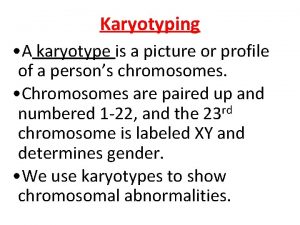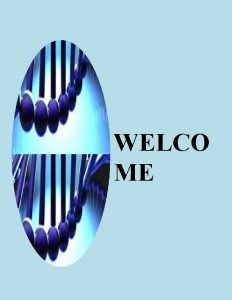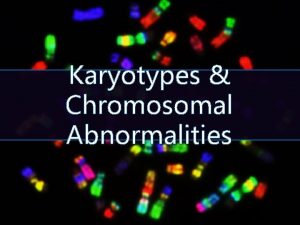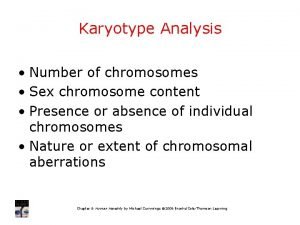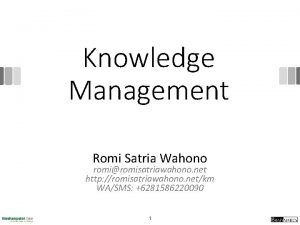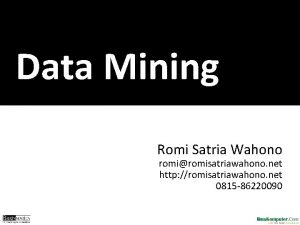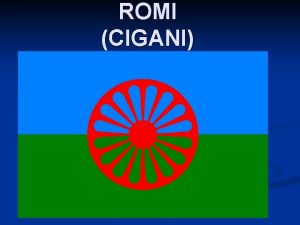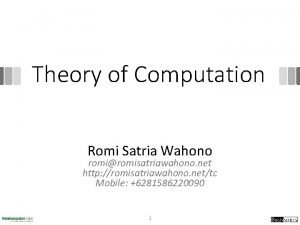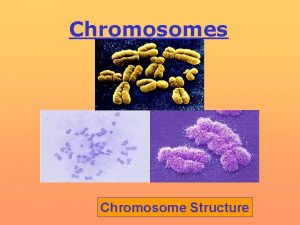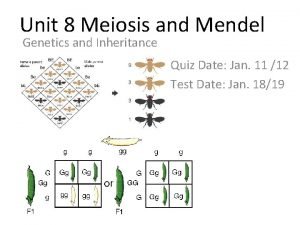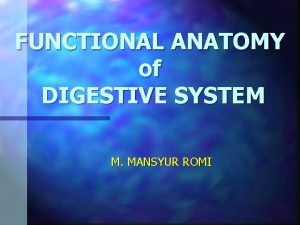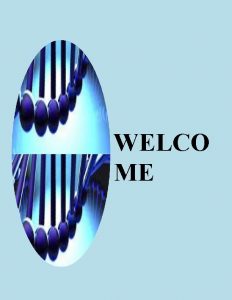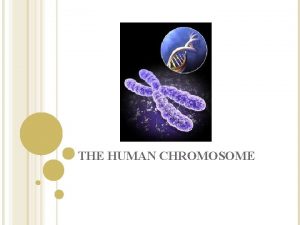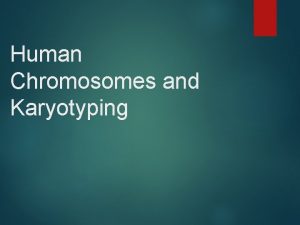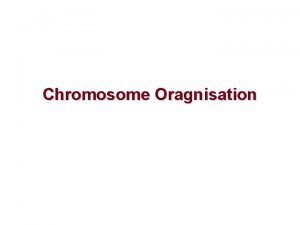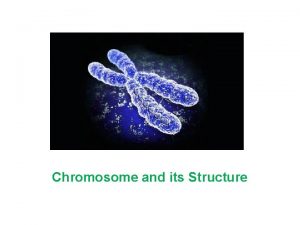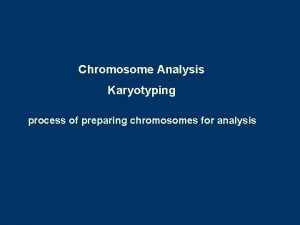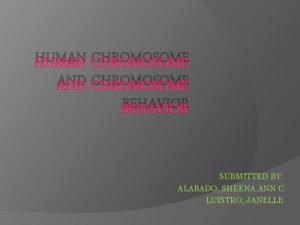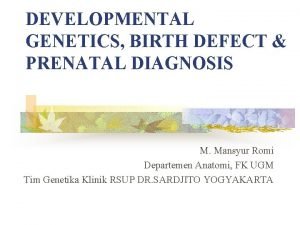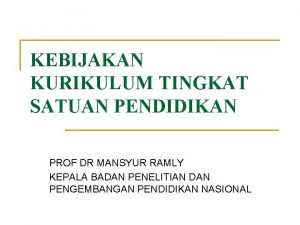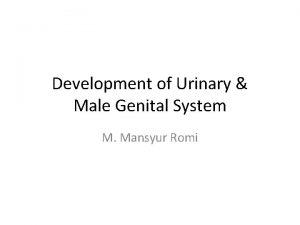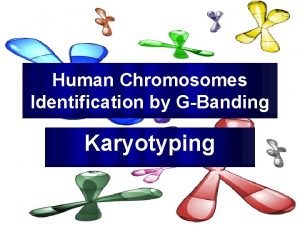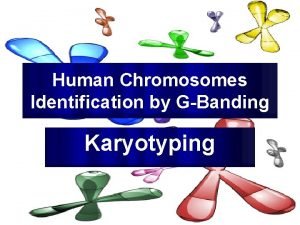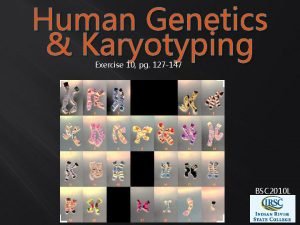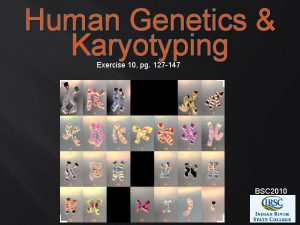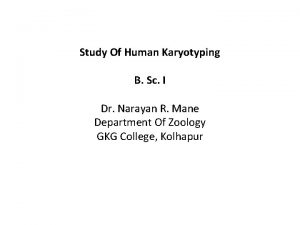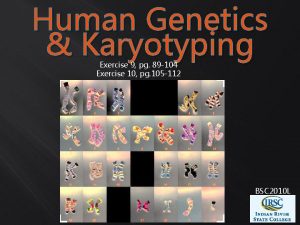HUMAN CHROMOSOME KARYOTYPING M Mansyur Romi CHROMOSOME The
























- Slides: 24

HUMAN CHROMOSOME & KARYOTYPING M. Mansyur Romi

CHROMOSOME • The highest order of DNA coiling • Each species has a characteristic number and size of chromosomes, known as karyotype. • The normal number of Xsomes in a nucleus: diploid (2 n) • During gametogenesos 2 n is halved one of eachpair = haploid (n)

Coiling of chromosomal/ nuclear DNA

CHROMOSOME – Duplicate themselves before the onset of cell division – Appear during metaphase – After replication each Xsome consist of two identical copies: sister chromatids juncside by side but still connected at the centromer.

CHROMOSOME – Structure: • Centromer (primary constriction) • Long arm (p) • Short arm (q) – Banding patterns: – Heterochromatin: highly condensed – Contains four known genes, its function is not well understood – Flanked to centomers – Euchromatin: more lightly – Contains most of the genes

Human kariotype 46, XY

Human Genome 23 chromosomes – 60, 000 – 70, 000 genes – 3 x 109 b. p. – 3, 000 c Morgans 1 Chromosome : – 2, 000 – 5, 000 genes – 1, 3 x 108 b. p. – 130 c. M

1 Chromosomal microband • 50 – 100 genes • 3 x 106 • 3 c. M 1/10 Chromosomal microband • ~230 x the length of one globin gene • 1/6 x the length of the duchenne locus



TURNER SYNDROME • Karyotipe 45, X • Diidentifikasi pertama kali tahun 1928 oleh Dr. Henry H Turner • Insiden 1/4000 bayi lahir hidup perempuan • Etiologi : Tidak adanya kromosom seks paternal (70%) • Biasanya lethal dalam uterus namun kompatibel dan dapat bertahan setelah kelahiran (99% abortus spontan)

Karyotype Turner Macam karyotipe 45, X 50% 46, X, i(Xq) 15% 45, X / 46, XX mosaik 15% 45, X / 46, X, i(Xq) mosaik ~5% 45, X, abnormalitas lain ~5%

Gambaran Klinis Turner • Perawakan pendek (rata 2 55 inci~137 cm) • Kelainan Kardiovaskular, penyebab tertinggi kematian • IQ normal atau diatas rata • Terdapat disgenesis gonada (ovarian dysgenesis)

KLINEFELTER SYNDROME • Karyotipe 47, XXY • Variant : 48, XXYY ; 48, XXXY ; 49, XXXXY • Etiologi : error pada : • Paternal Meiosis I • Maternal Meiosis I ~ usia ibu • Maternal Meiosis II • Post zigotic Mitotic ~ Mosaicism • Karena kegagalan rekombinasi Xp / Yp pada pseudoautosomal region • Insiden : 1/1000 bayi laki-laki lahir hidup • Merupakan kelainan kromosom seks pada manusia yang pertama kali dilaporkan

Karyotype Klinefelter

Kelainan 2 pada Klinefelter Syndrome • IQ rata-rata 85 – 90 • Anggota gerak yang panjang dan kurus • Pubertas usia normal namun testis kecil (< 2, 5 cm) • Hampir selalu infertil karena kegagalan perkembangan Germ Cell • Kadang-kadang didapatkan ginekomasti • Penurunan produksi testosteron • Juga didapatkan kesulitan belajar, membaca, bahasa, poor social adjustment

Karyotipe 47, XYY

XYY Syndrome • IQ rata-rata 10 -15 point dibawah rata 2 • Hiperaktif • Agresif atau sifat psikopatologi bukan gambaran umumnya • Gigi yang besar 2, dahi menonjol, telinga panjang, jari relatif panjang • Fertilitas normal, pubertas biasanya terlambat sampai 6 bulan

Genetic material

Gene Mapping § Assignment of a locus to a specific chromosome and / or § Determining the sequence of genes and their relative distance from one another on a specific chromosome Two types of map: ü physical map ügenetic or linkage map


GENE STRUCTURE • Promoter: the sequence elements located 5’ to the gene, which fix the site of initiation of transcription and control m. RNA quantity and sometimes tissue specificity • Exon: the transcribed regions of the gene that are present in mature m. RNA and usually contain coding information.

GENE STRUCTURE • Intron: a segment of a gene that is initially transcribed into RNA but is then removed from the primary transcript by splicing together the exon sequences on either side of it. • Enhancers: DNA sequences that act in CIS to increase transcription of a nearby gene. These can act in either orientation 5’ or 3’ to the gene and may act at considerable distance from the gene.

CHROMOSOME Xsomes of eukaryotes consist of: • DNA • Histone proteins both are constant and form nucleosome • Nonhistone proteins • RNA both vary with the metabolic activity of the cells
 Karyotyping
Karyotyping Klinefelter syndrome karyotype
Klinefelter syndrome karyotype Karyotyping
Karyotyping Fish karyotype
Fish karyotype What is karyotyping
What is karyotyping Nondisjunction
Nondisjunction Romi satria wahono
Romi satria wahono Kerangka pemikiran
Kerangka pemikiran Romi satria wahono
Romi satria wahono Data mining romi satria wahono
Data mining romi satria wahono Romi satria wahono
Romi satria wahono Kaloperi
Kaloperi Romi satria wahono
Romi satria wahono Describe the new accountability in terms of romi
Describe the new accountability in terms of romi Romi satria wahono
Romi satria wahono Prokaryotic chromosome vs eukaryotic chromosome structure
Prokaryotic chromosome vs eukaryotic chromosome structure Diploid number
Diploid number Thế nào là hệ số cao nhất
Thế nào là hệ số cao nhất Lp html
Lp html Sơ đồ cơ thể người
Sơ đồ cơ thể người Bảng số nguyên tố
Bảng số nguyên tố đặc điểm cơ thể của người tối cổ
đặc điểm cơ thể của người tối cổ Các châu lục và đại dương trên thế giới
Các châu lục và đại dương trên thế giới Mật thư anh em như thể tay chân
Mật thư anh em như thể tay chân Chụp tư thế worms-breton
Chụp tư thế worms-breton
